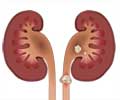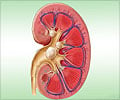Kidney stones can now be passed out without pain, reveals a new study. Pain caused by the contractions in the ureter, while passing a stone could be alleviated using muscle relaxants.
Highlights:
- A new study has identified that pain caused by the contractions in the ureter, while passing a stone could be alleviated using muscle relaxants
- Findings from the study will be key in helping millions suffering from kidney stone disease
- The treatment would also ease any pain during stent insertion in the ureter
Read More..
Treating Kidney Stones
Kidney stones are formed when hard crystals get accumulated in the kidney as a result of high solid waste content in the urine and absence of the adequate amount of liquid to wash it out. The prevalence of kidney stones has been estimated to be about one in every 10 people at some point in their lives. More than half a million Americans suffering from kidney stone problems visit the emergency room annually. In due course, the stones may pass out of the body by themselves; however, the process could be unbearably painful. Patients with smaller stones are usually recommended to wait for an average period of 10 days during which the stones would pass; those with larger stones would require surgery. In addition to painkillers, patients have also prescribed oral medication that would help the ureter relax. However, many studies have offered conflicting evidence on the effectiveness of this drug.Novel Approach to Treating Kidney Stones
A research team from MIT and Massachusetts General Hospital has proposed a new line of treatment and the study is featured in Nature Biomedical Engineering. The senior author of the study, Michael Cima is a member of MIT's Koch Institute for Integrative Cancer Research and also the David H. Koch Professor of Engineering in the Department of Materials Science and Engineering at MIT. The lead author is Christopher Lee, a PhD recipient from the Harvard-MIT Division of Health Sciences and Technology.They have identified a drug combination that would help walls of the ureter relax. Using an instrument similar to a catheter, the drug could be delivered directly to the ureter. The team says that the stones could move easily through the ureter, which is a tube that connects the kidneys to the bladder, if the walls are relaxed.
“We think this could significantly impact kidney stone disease, which affects millions of people,” Cima said. Following the passing of stones, sometimes stents are required to be inserted into the ureter in order to prevent blockage and collapse of the tube. This new treatment would also make the insertion easier and less painful.
Background of the Study
Brian Eisner, the co-director of the Kidney Stone Program at MGH and also a study author, alongside Cima, was contemplating ways to improve the treatment of kidney stones. They devised this approach, which would be a better alternative as it involves delivering the muscle relaxant directly to the ureter. When the stones pass through the narrow tube, cramps and inflammation in the ureter occur, causing most of the pain. Therefore, if the muscles around the tube are relaxed, the passage could be eased.Meanwhile, Lee, who had joined MIT's Health Sciences and Technology program, became interested in the field of kidney stone treatment when discussing possible thesis options with Cima. “If you look at how kidney stones are treated today, it hasn't really changed since about 1980, and there's a pretty substantial amount of evidence that the drugs given don't work very well. The volume of how many people this could potentially help is really exciting,” Lee commented.
Drug Selection Process
The first step involved identifying drugs that would work best when delivered directly to the ureter. 18 drugs used in treating conditions like high blood pressure or glaucoma were chosen and exposed to human ureteral cells that were grown in a lab dish. This allowed for measuring the extent to which the drugs were able to relax the smooth muscle cells. The hypothesis was that the level of relaxation would be higher when the drugs were administered directly to the ureter as opposed to taking them orally, which would also mean minimizing harm to the rest of the body.Talking about the selection of drugs, Cima said, “We found several drugs that had the effect that we expected, and in every case, we found that the concentrations required to be effective were more than would be safe if given systemically.”
An intensive computational processing was then used by the team to analyze individually, the relaxation responses of close to 1 billion cells following exposure to the drugs. Two drugs in particular were found to be very effective and worked even better when administered together - Nifedipine, which is a calcium channel blocker used in treating high blood pressure and ROCK (rho kinase) inhibitor, used in glaucoma treatment.
This drug combination in various doses was tested by the research team, in ureters removed from pigs and demonstrated that the occurrence and span of contractions of the ureter could be drastically reduced. Tests done on live pigs showed that the ureteral contractions were nearly eliminated by the treatment.
Way forward
Determining the extent of the muscle-relaxing effects, knowing how long they would last and the amount of relaxation required to accelerate the stone passage would require further studies, the research team said. A startup company, Fluidity Medicine, is also being launched by them where the technology for possible testing in humans could be developed.This approach could also be used for relaxing the ureter when doctors attempt to insert a ureteral stent. Other instruments like endoscopes could also be placed in the ureter using the technique. Lee summarized, “The platform pairs drug delivery to the ureter. We are eager to first target muscle relaxation, and as offshoots of that, we have kidney stones, ureteral stents, and endoscopic surgery. We have a bunch of other urological indications that would go through different developmental pathways but can all be hit and all have meaningful patient populations.”
Reference:
- New treatment could ease the passage of kidney stones - (http://news.mit.edu/2019/treatment-kidney-stone-passing-easier-1202)
Source-Medindia
















